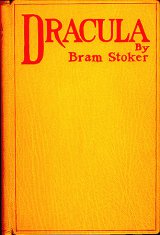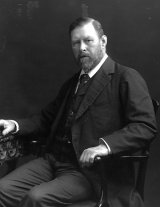Dracula Page #37
Dracula is an 1897 Gothic horror novel by Irish author Bram Stoker. It introduced Count Dracula, and established many conventions of subsequent vampire fantasy. The novel tells the story of Dracula's attempt to move from Transylvania to England so that he may find new blood and spread the undead curse, and of the battle between Dracula and a small group of men and a woman led by Professor Abraham Van Helsing.
"Yours always, "JOHN SEWARD." Letter, Abraham Van Helsing, M. D., D. Ph., D. Lit., etc., etc., to Dr. Seward. "2 September. "My good Friend,-- "When I have received your letter I am already coming to you. By good fortune I can leave just at once, without wrong to any of those who have trusted me. Were fortune other, then it were bad for those who have trusted, for I come to my friend when he call me to aid those he holds dear. Tell your friend that when that time you suck from my wound so swiftly the poison of the gangrene from that knife that our other friend, too nervous, let slip, you did more for him when he wants my aids and you call for them than all his great fortune could do. But it is pleasure added to do for him, your friend; it is to you that I come. Have then rooms for me at the Great Eastern Hotel, so that I may be near to hand, and please it so arrange that we may see the young lady not too late on to-morrow, for it is likely that I may have to return here that night. But if need be I shall come again in three days, and stay longer if it must. Till then good-bye, my friend John. "VAN HELSING." Letter, Dr. Seward to Hon. Arthur Holmwood. "3 September. "My dear Art,-- "Van Helsing has come and gone. He came on with me to Hillingham, and found that, by Lucy's discretion, her mother was lunching out, so that we were alone with her. Van Helsing made a very careful examination of the patient. He is to report to me, and I shall advise you, for of course I was not present all the time. He is, I fear, much concerned, but says he must think. When I told him of our friendship and how you trust to me in the matter, he said: 'You must tell him all you think. Tell him what I think, if you can guess it, if you will. Nay, I am not jesting. This is no jest, but life and death, perhaps more.' I asked what he meant by that, for he was very serious. This was when we had come back to town, and he was having a cup of tea before starting on his return to Amsterdam. He would not give me any further clue. You must not be angry with me, Art, because his very reticence means that all his brains are working for her good. He will speak plainly enough when the time comes, be sure. So I told him I would simply write an account of our visit, just as if I were doing a descriptive special article for The Daily Telegraph. He seemed not to notice, but remarked that the smuts in London were not quite so bad as they used to be when he was a student here. I am to get his report to-morrow if he can possibly make it. In any case I am to have a letter. "Well, as to the visit. Lucy was more cheerful than on the day I first saw her, and certainly looked better. She had lost something of the ghastly look that so upset you, and her breathing was normal. She was very sweet to the professor (as she always is), and tried to make him feel at ease; though I could see that the poor girl was making a hard struggle for it. I believe Van Helsing saw it, too, for I saw the quick look under his bushy brows that I knew of old. Then he began to chat of all things except ourselves and diseases and with such an infinite geniality that I could see poor Lucy's pretense of animation merge into reality. Then, without any seeming change, he brought the conversation gently round to his visit, and suavely said:-- "'My dear young miss, I have the so great pleasure because you are so much beloved. That is much, my dear, ever were there that which I do not see. They told me you were down in the spirit, and that you were of a ghastly pale. To them I say: "Pouf!"' And he snapped his fingers at me and went on: 'But you and I shall show them how wrong they are. How can he'--and he pointed at me with the same look and gesture as that with which once he pointed me out to his class, on, or rather after, a particular occasion which he never fails to remind me of--'know anything of a young ladies? He has his madams to play with, and to bring them back to happiness, and to those that love them. It is much to do, and, oh, but there are rewards, in that we can bestow such happiness. But the young ladies! He has no wife nor daughter, and the young do not tell themselves to the young, but to the old, like me, who have known so many sorrows and the causes of them. So, my dear, we will send him away to smoke the cigarette in the garden, whiles you and I have little talk all to ourselves.' I took the hint, and strolled about, and presently the professor came to the window and called me in. He looked grave, but said: 'I have made careful examination, but there is no functional cause. With you I agree that there has been much blood lost; it has been, but is not. But the conditions of her are in no way anæmic. I have asked her to send me her maid, that I may ask just one or two question, that so I may not chance to miss nothing. I know well what she will say. And yet there is cause; there is always cause for everything. I must go back home and think. You must send to me the telegram every day; and if there be cause I shall come again. The disease--for not to be all well is a disease--interest me, and the sweet young dear, she interest me too. She charm me, and for her, if not for you or disease, I come.' "As I tell you, he would not say a word more, even when we were alone. And so now, Art, you know all I know. I shall keep stern watch. I trust your poor father is rallying. It must be a terrible thing to you, my dear old fellow, to be placed in such a position between two people who are both so dear to you. I know your idea of duty to your father, and you are right to stick to it; but, if need be, I shall send you word to come at once to Lucy; so do not be over-anxious unless you hear from me." Dr. Seward's Diary. 4 September.--Zo� phagous patient still keeps up our interest in him. He had only one outburst and that was yesterday at an unusual time. Just before the stroke of noon he began to grow restless. The attendant knew the symptoms, and at once summoned aid. Fortunately the men came at a run, and were just in time, for at the stroke of noon he became so violent that it took all their strength to hold him. In about five minutes, however, he began to get more and more quiet, and finally sank into a sort of melancholy, in which state he has remained up to now. The attendant tells me that his screams whilst in the paroxysm were really appalling; I found my hands full when I got in, attending to some of the other patients who were frightened by him. Indeed, I can quite understand the effect, for the sounds disturbed even me, though I was some distance away. It is now after the dinner-hour of the asylum, and as yet my patient sits in a corner brooding, with a dull, sullen, woe-begone look in his face, which seems rather to indicate than to show something directly. I cannot quite understand it.
Translation
Translate and read this book in other languages:
Select another language:
- - Select -
- 简体中文 (Chinese - Simplified)
- 繁體中文 (Chinese - Traditional)
- Español (Spanish)
- Esperanto (Esperanto)
- 日本語 (Japanese)
- Português (Portuguese)
- Deutsch (German)
- العربية (Arabic)
- Français (French)
- Русский (Russian)
- ಕನ್ನಡ (Kannada)
- 한국어 (Korean)
- עברית (Hebrew)
- Gaeilge (Irish)
- Українська (Ukrainian)
- اردو (Urdu)
- Magyar (Hungarian)
- मानक हिन्दी (Hindi)
- Indonesia (Indonesian)
- Italiano (Italian)
- தமிழ் (Tamil)
- Türkçe (Turkish)
- తెలుగు (Telugu)
- ภาษาไทย (Thai)
- Tiếng Việt (Vietnamese)
- Čeština (Czech)
- Polski (Polish)
- Bahasa Indonesia (Indonesian)
- Românește (Romanian)
- Nederlands (Dutch)
- Ελληνικά (Greek)
- Latinum (Latin)
- Svenska (Swedish)
- Dansk (Danish)
- Suomi (Finnish)
- فارسی (Persian)
- ייִדיש (Yiddish)
- հայերեն (Armenian)
- Norsk (Norwegian)
- English (English)
Citation
Use the citation below to add this book to your bibliography:
Style:MLAChicagoAPA
"Dracula Books." Literature.com. STANDS4 LLC, 2024. Web. 26 Nov. 2024. <https://www.literature.com/book/dracula_10>.




Discuss this Dracula book with the community:
Report Comment
We're doing our best to make sure our content is useful, accurate and safe.
If by any chance you spot an inappropriate comment while navigating through our website please use this form to let us know, and we'll take care of it shortly.
Attachment
You need to be logged in to favorite.
Log In